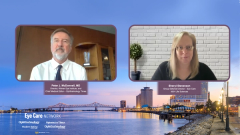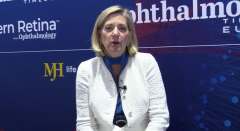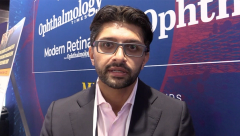
Peter J. McDonnell, MD, reflects on key takeaways from AAO 2021
Episodes in this series

Peter J. McDonnell, MD, shares some of many highlights from this year’s annual meeting of the American Academy of Ophthalmology in New Orleans.
HEADLINE: Post-AAO 2021 takeaways from Dr. McDonnell
Sheryl Stevenson: Well, Dr. McDonald, so great to see you again. I hope you've recovered from the Academy meeting this year in New Orleans,
Peter J. McDonald, OD, FAAO: Ms. Stevenson's … always a pleasure to see you. I heard people saw you with the marching band around the convention hall, but I didn't see you do that. But I heard you were really enjoying New Orleans.
Stevenson: Well, it's great to be back. I just want to take a few minutes and check in with you and see what your impressions were. What the takeaways were that you brought back from this meeting?
McDonald: Well, my view: the American Academy of Ophthalmology is a great organization. It should be the model for all the other medical specialties with their professional organizations. They always do a great job with this meeting. They put on the biggest meeting of ophthalmologists in the world. The meetings cover everything.
You learn a lot about whatever is exciting and interesting to you based on your practice. Pandemic or not, the Academy did its usual great job this year to help educate our fellow ophthalmologists. There were medical students there and residents, and everybody by all reports had a great time. My congratulations to the Academy leadership for doing such a good job again this year.
Stevenson: Absolutely. I know they had a lot of safety precautions in place. You had to be vaccinated to attend the in-person component of it. There was also a virtual component. Masks were required during the actual time they were in the convention center.
A lot of precautions were taken but I feel everybody had a really good time. A lot of good content was presented. Even starting from subspecialty day, I should say that, a lot of the different topics that were focused there and continuing into the main actual conference.
McDonald: Yeah. The subspecialty days are so super popular. They have been for decades, and under [CEO] David Parkes’ leadership at the Academy, they've just been growing and growing in interest in popularity. One of the fun features of the subspecialty days is that they reserve parts of the schedule for the breaking exciting news. Not things that were submitted 6 months ago to the Academy, but things that maybe article presentations about what's happened just within the last few weeks.
Despite the pandemic, there's been a lot of innovation this year in ophthalmology and recent FDA approvals of new drugs and new technologies for treating eye disease. There was a lot of good information at the Academy about some of these new products, and that engendered a lot of interest, whether it's front of the eye dry eye or back of the eye for retinal disease.
Stevenson: Absolutely. I guess in talking to some of your fellow colleagues, what are some of the highlights that you've been hearing from fellow ophthalmologists from this year's meeting?
McDonald: Well, I was smart enough to become a retina specialist. I'm a cornea person but my retina colleagues tell me there's tremendous interest in the just recently approved port delivery system (PDS) for delivering ranibizumab (Lucentis, Genentech).
During this pandemic, having these people come in every month or 8 weeks to get an intravitreal injection is quite a challenge— both on the patients and the doctors and the clinics. The newly FDA-approved delivery system allows the opportunity to dramatically reduce the number of visits and the frequency of injections for these patients.
I believe the launch of this device is going to be pretty soon and there was tremendous interest in learning about it. I think tremendous eagerness amongst our retina brothers and sisters to be able to begin to look at incorporating this into their practices and to see for which patients it works well and how well it's accepted amongst the patients with (age-related macular degeneration) AMD.
The new, recently approved super choroidal administration of triamcinolone (Bausch + Lomb, Clearside Biomedical) using these micro needles Xipere, is that name apparently of this which will again be launched in the new year. This is an interesting—also new—technology for retinal disease as for macular edema in the setting of uveitis. But instead of intravitreal injections, these are through the sclera into the super choral space.
This is a whole new thing for us ophthalmologists. There is a lot of going to be learning on how to do this. It'll be again interesting to see how this gets adopted. The approval is for macular edema in uveitis patients, but obviously there is the potential for triamcinolone to be helpful for other indications. I think this was an exciting topic in New Orleans. One that will be a very exciting topic coming into the new year in our meetings in 2022.
Then I'm a cornea external disease dry eye person. The newly approved this company called Oyster Point (Pharmaceuticals) and its nasal spray—this is worth learning about. This is the drug that's used to help reduce the craving for smoking and administered intra-nasally.
It improves dry eye in the FDA trials. This will be interesting because it's such a new route of administration, treating an eye problem with a nasal spray. It'll be interesting to see when this launches in the first quarter of next year, how this new way of administering medication for eye disease, [and] how readily it's accepted by both doctors and our dry eye patients.
Some very interesting new technologies. In each case, it's not so much a new drug. They're preexisting drugs but new ways of delivering the drug. Triamcinolone has been around forever. Ranibizumab for a long time. As I mentioned with the nasal spray, the active agent has been available for quite a while now for smoking cessation. It's about new routes of administration for new ophthalmic indication. It's exciting to see all these innovation despite the pandemic.
Newsletter
Don’t miss out—get Ophthalmology Times updates on the latest clinical advancements and expert interviews, straight to your inbox.




























